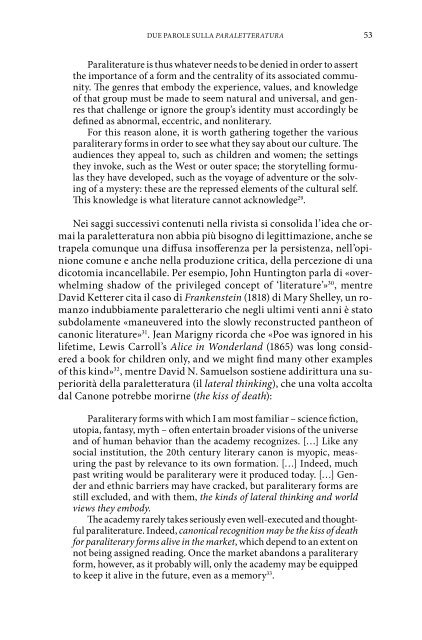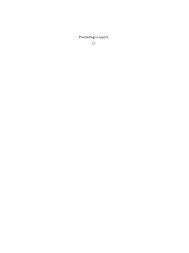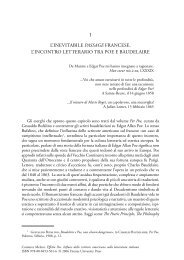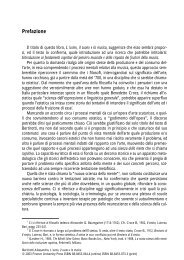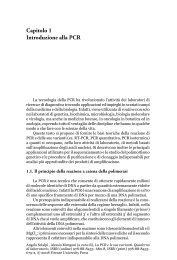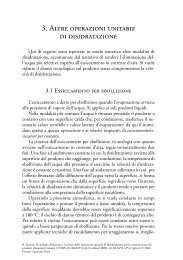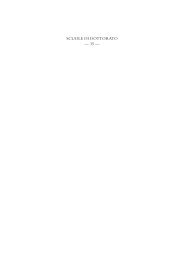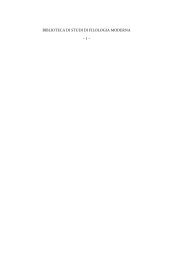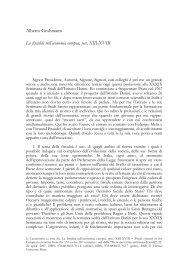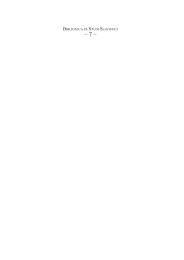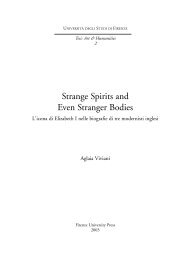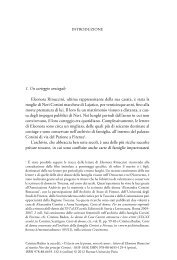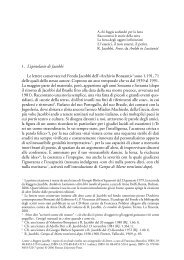biblioteca di studi di filologia moderna – 10 - Firenze University Press
biblioteca di studi di filologia moderna – 10 - Firenze University Press
biblioteca di studi di filologia moderna – 10 - Firenze University Press
You also want an ePaper? Increase the reach of your titles
YUMPU automatically turns print PDFs into web optimized ePapers that Google loves.
due Parole sulla PARALETTERATURA 53<br />
Paraliterature is thus whatever needs to be denied in order to assert<br />
the importance of a form and the centrality of its associated community.<br />
The genres that embody the experience, values, and knowledge<br />
of that group must be made to seem natural and universal, and genres<br />
that challenge or ignore the group’s identity must accor<strong>di</strong>ngly be<br />
defined as abnormal, eccentric, and nonliterary.<br />
for this reason alone, it is worth gathering together the various<br />
paraliterary forms in order to see what they say about our culture. The<br />
au<strong>di</strong>ences they appeal to, such as children and women; the settings<br />
they invoke, such as the West or outer space; the storytelling formulas<br />
they have developed, such as the voyage of adventure or the solving<br />
of a mystery: these are the repressed elements of the cultural self.<br />
This knowledge is what literature cannot acknowledge 29 .<br />
nei saggi successivi contenuti nella rivista si consolida l’idea che ormai<br />
la paraletteratura non abbia più bisogno <strong>di</strong> legittimazione, anche se<br />
trapela comunque una <strong>di</strong>ffusa insofferenza per la persistenza, nell’opinione<br />
comune e anche nella produzione critica, della percezione <strong>di</strong> una<br />
<strong>di</strong>cotomia incancellabile. Per esempio, John Huntington parla <strong>di</strong> «overwhelming<br />
shadow of the privileged concept of ‘literature’» 30 , mentre<br />
david Ketterer cita il caso <strong>di</strong> Frankenstein (1818) <strong>di</strong> mary shelley, un romanzo<br />
indubbiamente paraletterario che negli ultimi venti anni è stato<br />
subdolamente «maneuvered into the slowly reconstructed pantheon of<br />
canonic literature» 31 . Jean marigny ricorda che «Poe was ignored in his<br />
lifetime, lewis carroll’s Alice in Wonderland (1865) was long considered<br />
a book for children only, and we might find many other examples<br />
of this kind» 32 , mentre david n. samuelson sostiene ad<strong>di</strong>rittura una superiorità<br />
della paraletteratura (il lateral thinking), che una volta accolta<br />
dal canone potrebbe morirne (the kiss of death):<br />
Paraliterary forms with which i am most familiar <strong>–</strong> science fiction,<br />
utopia, fantasy, myth <strong>–</strong> often entertain broader visions of the universe<br />
and of human behavior than the academy recognizes. […] like any<br />
social institution, the 20th century literary canon is myopic, measuring<br />
the past by relevance to its own formation. […] indeed, much<br />
past writing would be paraliterary were it produced today. […] gender<br />
and ethnic barriers may have cracked, but paraliterary forms are<br />
still excluded, and with them, the kinds of lateral thinking and world<br />
views they embody.<br />
The academy rarely takes seriously even well-executed and thoughtful<br />
paraliterature. indeed, canonical recognition may be the kiss of death<br />
for paraliterary forms alive in the market, which depend to an extent on<br />
not being assigned rea<strong>di</strong>ng. once the market abandons a paraliterary<br />
form, however, as it probably will, only the academy may be equipped<br />
to keep it alive in the future, even as a memory 33 .


